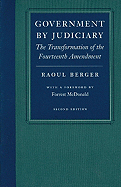Judicial “Discretion” in 1787
by Raoul Berger EDITOR’S NOTE: The following is an excerpt of the book (chapter 16) Government by Judiciary: The Transformation of the Fourteenth Amendment, Foreword by Forrest McDonald (2nd ed.) (Indianapolis: Liberty Fund, 1997). A common historicist fallacy is to import our twentieth-century conceptions into the minds of the Founders. At the adoption of the Constitution the notion that judges, for example, could make law as an instrument of social change was altogether alien to colonial thinking. “Instrumentalism” was yet to come. In a valuable essay Morton J. Horwitz observed that “fear of judicial discretion had long been part of colonial political rhetoric” and described the prevalent jural conceptions that combined to circumscribe the judicial function in the eighteenth century. There was first …
